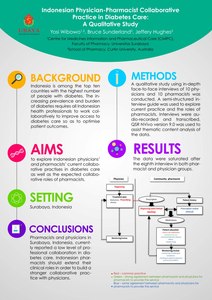Wibowo, Yosi Irawati and Sunderland, Bruce and Hughes, Jeffery (2016) Indonesian Physician-Pharmacist Collaborative Practice in Diabetes Care: A Qualitative Study. In: 33rd World Congress of Internal Medicine (WCIM Bali 2016), 22-25 Agustus 2016, Nusa Dua, Bali.
![[thumbnail of Irawati Poster.jpg]](/28985/1.hassmallThumbnailVersion/Irawati%20Poster.jpg)  Preview |
Image (JPEG)
Irawati Poster.jpg Download (185kB) | Preview |
Abstract
Background: Indonesia is among the top ten countries with the highest number of people with diabetes. The increasing prevalence and burden of diabetes require all Indonesian health professionals to work more collaboratively to improve access to diabetes care so as to optimise patient outcomes. This study aims to explore Indonesian physicians’ and pharmacists’ current collaborative practice in diabetes care as well as their expected roles of pharmacists in the collaboration. Methods: A qualitative study using in-depth face-to-face interviews of 10 physicians and 10 pharmacists in Surabaya, Indonesia, was conducted. A semi-structured interview guide was used to explore current practice and roles of pharmacists. Interviews were audio-recorded and transcribed. QSR NVivo version 9.0 was used to assist thematic content analysis of the data. Results: The data were saturated after the eighth interview with both pharmacist and physician groups. Pharmacists and physicians in Surabaya, Indonesia, were reported to practise a low level of collaboration in diabetes care. Physicians have generally focused on diagnosing and prescribing; community pharmacists have mainly dispensed medications (with limited labelling) and provided basic information on how to use medications. There was strong agreement between physician and pharmacist groups for pharmacists to provide education on medications (i.e. directions for use). A lower level of agreement was reported regarding pharmacists to conduct prescription review (clinical aspects), education related to medications (i.e. common/important adverse effects) and healthy living (i.e. exercise and diet); and the monitoring of medication compliance and treatment outcomes (i.e. checking on patients’ glycaemic control and problems) Conclusions: Indonesian pharmacists should extend their clinical roles in order to build a stronger collaborative practice with physicians. The Government and the professional bodies should develop strategies to support pharmacists’ extended roles and thus their collaboration with physicians in the interest of improved health of type 2 diabetes patients in Indonesia.
| Item Type: | Conference or Workshop Item (Poster) |
|---|---|
| Subjects: | R Medicine > R Medicine (General) R Medicine > RS Pharmacy and materia medica |
| Divisions: | Faculty of Pharmacy > Department of Pharmacy |
| Depositing User: | Yosi Irawati Wibowo 202026 |
| Date Deposited: | 27 Feb 2017 04:51 |
| Last Modified: | 30 Aug 2017 07:23 |
| URI: | http://repository.ubaya.ac.id/id/eprint/28985 |
Actions (login required)
 |
View Item |

